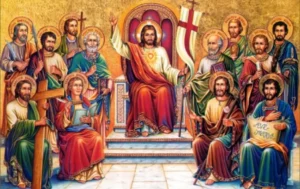The term “apostle” is widely recognized within religious contexts, particularly in Christianity. However, its implications extend beyond mere religious roles. This article delves into the origin, evolution, and the multi-faceted roles of apostles, shedding light on their enduring significance in religious traditions.
Origin of the Term
The word “apostle” is derived from the Greek word “apostolos,” which means “one who is sent away” or “messenger.” This term is used predominantly in the New Testament of the Christian Bible to refer to individuals specifically chosen by Jesus Christ to preach the Gospel and spread Christianity across the world.
The Twelve Apostles
In the context of Christianity, the most renowned apostles are the Twelve Apostles, chosen by Jesus during his earthly ministry. These include Peter, James, John, Andrew, Bartholomew, James the Lesser, Judas Iscariot (later replaced by Matthias following his betrayal of Jesus), Jude Thaddeus, Matthew, Philip, Simon the Zealot, and Thomas. Each of these figures played pivotal roles in the early spread of Christianity and are honored as saints in various Christian traditions.
Roles and Responsibilities
The primary role of an apostle is to act as a messenger and proponent of the faith. In the early Christian church, apostles were tasked with spreading Jesus’ teachings, baptizing new believers, and establishing new churches. Their authority was considered divinely bestowed, giving them a foundational role in the development and doctrine of the church.
Beyond the original Twelve, the term “apostle” has been applied to other key figures in the history of Christianity, such as Paul, known as the “Apostle to the Gentiles.” Paul’s extensive writings and missionary journeys significantly shaped Christian theology and practice.
Apostles in Different Traditions
While the concept of an apostle is most closely associated with Christianity, similar roles exist in other religious traditions. For example, in Islam, the word “apostle” (Rasul) refers to prophets sent with specific messages or scriptures, like Muhammad.
Contemporary Interpretations
In modern Christian contexts, the concept of an apostle has evolved. Some denominations, particularly those within Pentecostal and Charismatic movements, recognize modern-day apostles. These individuals are seen as leaders with specific mandates to foster spiritual growth and organizational development within the church.
Conclusion
Apostles, whether historical figures from the early days of Christianity or modern-day spiritual leaders, serve as pivotal messengers of faith. Their legacy is not only preserved in sacred texts but also in the ongoing influence they have on religious practices and beliefs worldwide.
Understanding the role of an apostle helps in appreciating not just the origins of major world religions, but also the ways these religions evolve and adapt in contemporary society. By recognizing the historical and modern implications of apostleship, one gains deeper insights into the dynamic nature of religious leadership and its impact on followers across generations.





